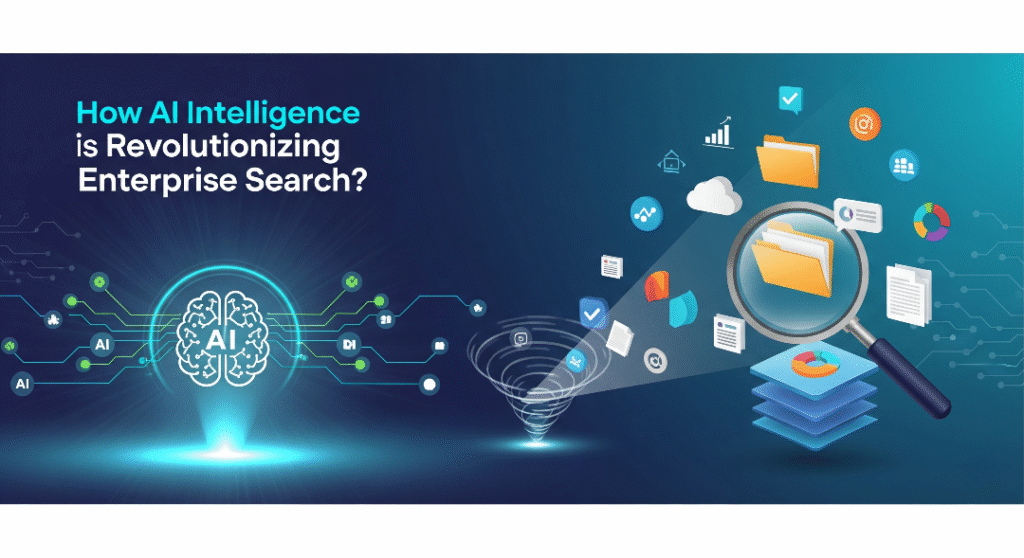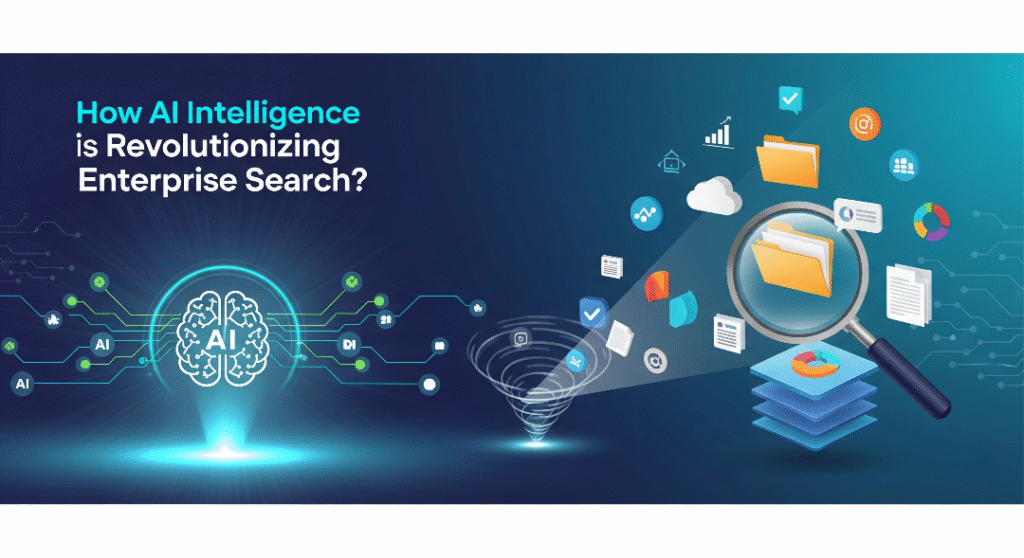In today’s enterprises, the amount of information might be overwhelming. Documents, data, and digital assets are everywhere in businesses. Finding what you need, when you need it, often feels like searching for a needle in a digital haystack. This is where enterprise search comes into play. It’s designed to unify disparate data sources, making internal information accessible. However, traditional search methods have their limits. They often struggle with context and intent. Thankfully, Artificial Intelligence (AI) is transforming enterprise search into an intelligent knowledge hub. It is now a strategic need rather than a luxury. This shift drives efficiency, fuels innovation, and significantly impacts customer-facing functions like e-commerce.
The Evolution of Enterprise Search: From Keywords to Intelligence
Older keyword-based search systems have notable shortcomings. They often provide poor relevance. Siloed data sources compound the problem. Furthermore, these systems struggle to understand the true context of a query. Users frequently face frustration with irrelevant results. Fortunately, AI is overcoming these limitations. Technologies like Natural Language Processing (NLP) and Machine Learning (ML) are leading the charge. They enable a powerful transition. We are moving from merely “finding” information to truly “discovering” deep insights. Information retrieval has advanced significantly as a result of this.
The Pillars of AI-Powered Enterprise Search
AI-powered enterprise search relies on several key technological advancements. Each is essential to improving search skills.
Natural Language Processing (NLP)
- ➫ NLP is fundamental to intelligent search.
- ➫ It allows systems to understand human language.
- ➫ This means discerning user intent and context accurately.
- ➫ For instance, “scaling” might mean different things.
- ➫ It could refer to DevOps or Sales.
- ➫ NLP helps differentiate these meanings.
- ➫ It also enables more conversational search interfaces.
- ➫ Users can ask questions naturally.
Machine Learning (ML)
- ➫ Machine Learning continuously improves search relevance.
- ➫ It learns from user behavior and feedback.
- ➫ This includes clicks and query refinements.
- ➫ ML also enables the personalization of search results.
- ➫ Individual users or specific roles receive tailored information.
- ➫ Moreover, it consistently learns from new data.
- ➫ This ensures continuous enhancement of accuracy.
Semantic Search & Knowledge Graphs
- ➫ These technologies move beyond simple keyword matching.
- ➫ Semantic search focuses on the meaning behind queries.
- ➫ It connects related concepts effectively.
- ➫ This provides more comprehensive answers.
- ➫ Knowledge graphs visually represent these relationships.
- ➫ They help users explore interconnected information.
- ➫ This facilitates deeper understanding.
Vector Embeddings
- ➫ Vector embeddings are a more advanced technique.
- ➫ They represent complex relationships between data points.
- ➫ This allows for highly accurate similarity matching.
- ➫ These embeddings help the system understand nuanced connections.
- ➫ Google’s new MUVERA algorithm is a prime example.
- ➫ MUVERA enables efficient multi-vector retrieval.
- ➫ It brings speed and accuracy to large-scale applications.

Beyond Internal Operations: AI-Powered Enterprise Search in E-commerce
The impact of AI-powered enterprise search extends far beyond internal operations. It’s particularly transformative for e-commerce. It significantly enhances the customer experience (CX).
Enhanced Customer Experience (CX)
- ➫ Customers benefit immensely from intelligent product discovery.
- ➫ They can find what they need effortlessly.
- ➫ This is true even with vague or descriptive queries.
- ➫ Look up “comfortable running shoes for wide feet.”
- ➫ The system understands the nuances.
- ➫ Personalized recommendations are another huge advantage.
- ➫ Leveraging search data, AI suggests highly relevant products.
- ➫ This is similar to Amazon’s sophisticated engine.
- ➫ Furthermore, AI enables emerging search methods.
- ➫ Voice search and visual search are becoming commonplace.
- ➫ These features provide a seamless shopping experience.
Streamlined E-commerce Operations
- ➫ AI-powered search also optimizes internal e-commerce operations.
- ➫ Employees can quickly locate vital information.
- ➫ This includes inventory and supply chain data.
- ➫ Details on stock levels, supplier information, and logistics become instantly accessible.
- ➫ Customer support automation sees major improvements.
- ➫ AI chatbots utilize enterprise search to provide instant answers.
- ➫ They handle common e-commerce queries.
- ➫ This covers order status, returns, and product details.
- ➫ Moreover, marketing and sales benefit greatly.
- ➫ Analyzing customer search trends informs product development.
- ➫ It also helps refine marketing strategies.
- ➫ Lastly, AI-driven search patterns aid fraud detection.
- ➫ They can quickly flag suspicious activities.
Implementing AI-Powered Enterprise Search: Key Considerations
Adopting AI-powered enterprise search requires careful planning. Several key considerations are crucial for successful implementation.
Data Integration
- ➫ Data integration is paramount.
- ➫ Unifying data from diverse sources is often complex.
- ➫ This includes CRMs, ERPs, and CMS systems.
Security & Permissions
- ➫ Security and permissions are also vital.
- ➫ Ensuring users only access authorized information is non-negotiable.
User Adoption
- ➫ User adoption is another important factor.
- ➫ Intuitive interfaces and thorough training are essential for success.
Continuous Improvement
- ➫ Finally, continuous improvement is key.
- ➫ AI models require ongoing refinement.
- ➫ This ensures sustained high performance.
The Future of Enterprise Search: More Intelligent, More Integrated
The future of enterprise search is bright. We can expect even greater intelligence. Generative AI will provide more direct answers. It will also offer deeper insights. AI will create truly proactive information access. This will lead to predictive capabilities. The involvement of a skilled web developer will be needed. They will integrate these complex systems. Businesses looking for cutting-edge solutions should consider hiring web developer experts. Seeking expert web development solutions is a wise investment. They can tailor these advanced search capabilities.
Ready to unlock the full potential of your business data? Consider exploring expert web development solutions to implement AI-powered enterprise search. Mindbees offers comprehensive services to help you navigate this complex landscape.

